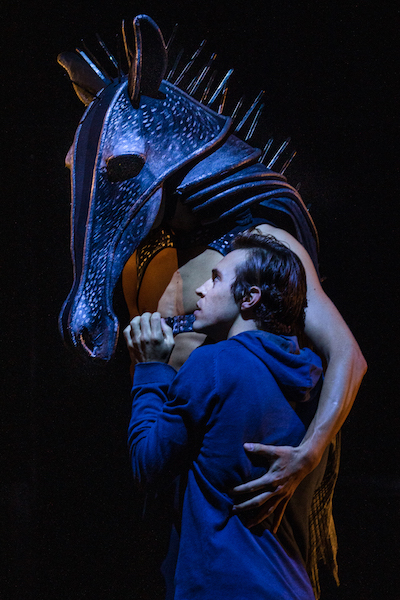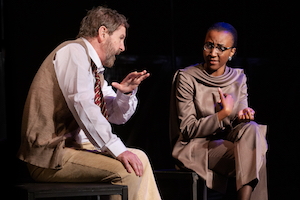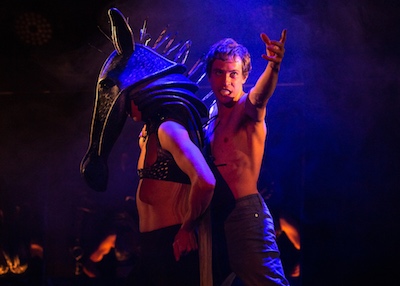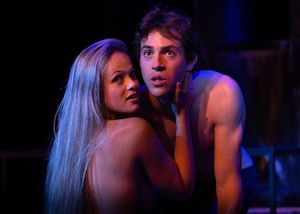 Some people have incredibly intelligent brains that let them think amazing thoughts. Others have incredibly warped brains that lead them to commit horrendous acts.
Some people have incredibly intelligent brains that let them think amazing thoughts. Others have incredibly warped brains that lead them to commit horrendous acts.
Put the two together and you get Equus, a complex psychological play about a boy who worships horses, is sexually stimulated by them, then blinds them with a metal spike in a night of outrageous frenzy. Deep theatre that questions why people are driven to do what they do, and how trying to dumb everybody down to ‘normal’ risks snuffing out the spark that makes life worth living.
This play by Peter Shaffer is based on a true story, and billed as a two-character conflict around the struggle between mind and body, intellect and emotion, rational modernity and primeval force.
That’s all handled brilliantly by Graham Hopkins as the rumpled and jaded psychiatrist Dr Martin Dysart, and Sven Ruygrok as 17-year-old Alan Strang, the stable boy arrested for blinding six horses. Their therapy sessions form the heart of Equus, where the doctor slowly draws out the boy’s thoughts and feelings in rich scenes that blend tension, humour and drama.
Hopkins holds it all together with narration between the confrontations, telling us of his own disillusionment with life, marriage, psychiatry and chiefly with himself. He yearns to be striding through Greece exploring ancient mythology, but he packs his suitcase too carefully and treads too timidly. He’s superb as the unhappy older man, unsettled to find himself jealous of the boy who gallops while he will only ever plod. He has shrunk and settled in his own life from timidity, he sighs, as have so many others.
 The psychiatrist’s mental wrangling with his task of eliminating Alan’s weird obsession when he knows it will reduce the boy to an empty shell is thoughtful, mind-expanding stuff.
The psychiatrist’s mental wrangling with his task of eliminating Alan’s weird obsession when he knows it will reduce the boy to an empty shell is thoughtful, mind-expanding stuff.
Ruygrok as Alan is also excellent, with a sullen face that can leap into animated curiosity or excitement then lapse back into an impenetrable void. He morphs beautifully between the sulky, troubled teenager and the passionate, awe-filled worshipper of his four-legged deity.
The lighting is excellent and perfectly timed as the protagonists wrangle or the boy relives his memories, throwing dramatic highlights that augment the mood and action.
The horse masks are also magnificent, and the movements of the actors as they portray the horses are lithe and sinuous. Len-Barry Simons plays Nugget, the main focus of Alan’s obsession, with movements that are almost coy and sensual, and the horse outfits with their dominatrix high heels and fetish-style leather chest harnesses enhance the aspect of worshiping the horse as both god and slave.
 The equine movements were choreographed by Marc Goldberg, and the image of the boy on a galloping horse is an intense showstopper for the end of act one.
The equine movements were choreographed by Marc Goldberg, and the image of the boy on a galloping horse is an intense showstopper for the end of act one.
While the chief drama is between Alan and his psychiatrist, the other characters around them are less memorable. Andrew Roux as his father Frank is too wooden, creating a sense that he’s reciting the script and trying to conjure up the necessary bluster rather than genuinely feeling its emotions. Maggie Gericke as his mother Dora is more convincing with her constant nervous fidgeting and prim religion, and both do a decent enough job with a tricky regional English accent.
Cassandra-Tendai Mapanda as the local magistrate gives the role grace and humour, although her main purpose is to serve as a foil to Dysart’s insecurities.
 There’s full-on nudity too, when Alan and Jill the stable-lass (Monique Basson) begin an ill-fated romp in the hay, but it’s such an integral part of the drama with so many emotions raging at that stage that there’s little shock factor or anything to harrumph about. Basson is the strongest among the supporting cast, playing Jill with an attractive confidence.
There’s full-on nudity too, when Alan and Jill the stable-lass (Monique Basson) begin an ill-fated romp in the hay, but it’s such an integral part of the drama with so many emotions raging at that stage that there’s little shock factor or anything to harrumph about. Basson is the strongest among the supporting cast, playing Jill with an attractive confidence.
Despite one or two weaknesses in the cast, director Fred Abrahamse, designer Marcel Meyer and composer Charl-Johan Lingenfelder have delivered an absorbing and stimulating piece of cerebral theatre.
Equus runs at Montecasino Theatre until May 26. Tickets from Computicket. Photos by Jesse Kramer.